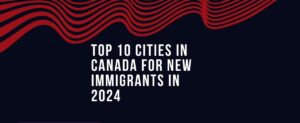Last year, Canada welcomed 450,000 new international students, a record. Among the reasons Canada is so attractive to international students include the country’s high-quality education, safety, security, and multiculturalism. Canada allows international students to work during their studies and be eligible for a Post-Graduation Work Permit (PGWP) after completing their program.
The PGWP allows international students to gain additional Canadian work experience, which can improve their odds of eventually gaining Canadian permanent residence. Indeed, many of Canada’s over 100 economic class immigration programs cater to international students. Canadian government research shows that former international students tend to perform well in the labour market once they gain permanent residence. They are young, well-educated, speak English and French fluently, and have Canadian work experience.
So, how can you study in Canada?
Step 1: Research where you want to study
Canada offers international students many high-quality colleges, universities, and other post-secondary institutions.
Research educational programs that align with your interests and career goals.
It would be best to research the Immigration, Refugees and Citizenship Canada (IRCC) website before applying to a program. You want to ensure that the post-secondary institution of your choice is on IRCC’s list of designated learning institutions (DLI). A DLI is an institution authorized by the government to welcome international students.
If you want to get a PGWP after your studies, you should also ensure you apply to a program and DLI that can allow you to be eligible for a PGWP. This information is also available on IRCC’s website.
Once you have identified a short list, apply it to educational institutions.
Step 2: Get a Letter of Acceptance (LOA)
You will receive a Letter of Acceptance (LOA) once a Canadian DLI approves you. You need the LOA to submit your study permit application to IRCC.
The LOA contains details such as:
- The name of the DLI and contact information of the DLI
- Your name, date of birth, and mailing address
- The study program, level of the program, duration of the program, its start date, and estimated date of completion
- The expiry date of the LOA
Step 3: Apply for a Study Permit
You can submit your study permit application directly to IRCC. It is also beneficial to hire an experienced Canadian immigration lawyer to submit the study permit application on your behalf. They can use their significant knowledge to ensure you submit the most substantial and accurate application possible.
IRCC will require a list of documents when reviewing your study permit application, such as:
- Your LOA
- Proof of financial support to cover your tuition and living expenses in Canada
- Police certificates
- Medical exams, if applicable
- Letter of explanation detailing your career objectives and ties to your home country
Quebec
Suppose you wish to study in the province of Quebec. In that case, you must apply for and obtain a Certificate d’Acceptation du Quebec (CAQ) from the Quebec government before you submit your study permit application to IRCC.
Student Direct Stream
Canada also offers a fast-track study permit option called the Student Direct Stream (SDS). The SDS is available to those who live in any of these countries:
- India
- China
- The Philippines
- Pakistan
- Vietnam
- Morocco
- Senegal
- Brazil
- Colombia
- Peru
- Antigua and Barbuda
- Costa Rica
- Trinidad and Tobago
- Saint Vincent and the Grenadines
IRCC’s processing standard for most SDS applications is 20 days, and you need to submit your SDS application online.
The eligibility criteria for the SDS are similar to a typical study permit application but include essential additional requirements. Among them include needing to obtain a minimum of 6.0 on each skill on the IELTS, or if you are taking a French test, you need the equivalent of a Canadian Language Benchmark (CLB) score of at least 7 in each skill on the TEF.
You must also get a Guaranteed Investment Certificate (GIC) with a participating Canadian bank of CAD 10,000.
Enjoy your studies in Canada
Canada is home to a world of opportunities for international students. It provides excellent education, living standards, and job opportunities during and after your studies. It also has more than 100 different immigration pathways for the various economic classes, including those encouraging international graduates to apply. Canada has lifted much of its COVID-19 restrictions, so now is a great time to pursue your education here.








